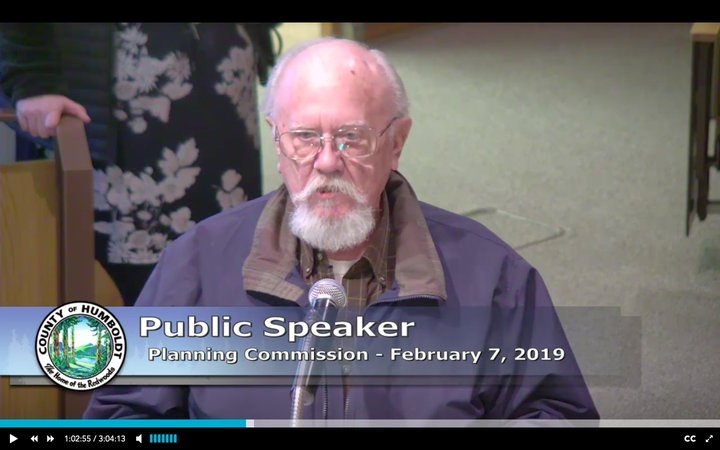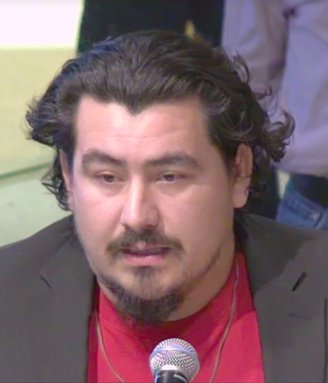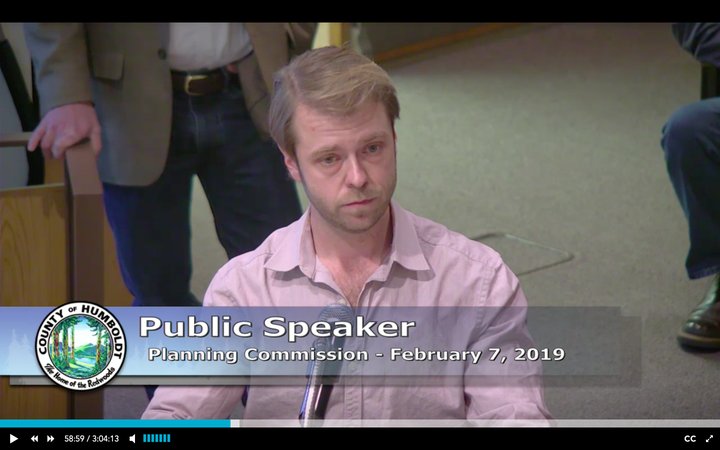
Phil Smith, longtime resident of the applicant’s property near Weitchpec, addresses the Humboldt County Planning Commission. | Screenshot of meeting video courtesy the County of Humboldt.
In a landmark decision for tribal rights in the region, the Humboldt County Planning Commission last night voted narrowly to deny a commercial cannabis cultivation permit on private property near Weitchpec because the land, which straddles State Route 96 on the north bank of the Klamath River, lies within 600 feet of a Tribal Cultural Resource.
In fact, while 14-acre property has been owned by local resident Phil Smith and his family since 1973, it sits entirely within an area the Yurok Tribe has designated the Ke’Wet Ceremonial District. The tribe didn’t officially recognize it as such until November, much to the frustration of Phil Smith and his son Lucien, who submitted the application through his business, Bluff Creek Company Inc.
At last night’s meeting, the elder and younger Smith both voiced frustration at having made significant financial investments over the past few years only to have a wrench thrown into the works so late in the game. They’ve been operating a 9,200-square-foot outdoor cannabis grow under a temporary permit from the county.
The county’s commercial cannabis land use ordinance requires a 600-foot setback from tribal cultural resources, and leaders from both the Yurok and Karuk tribes spoke at the meeting about the cultural and historical importance of this specific area.

An aerial view of the existing outdoor growing operation on the applicant’s property. | Courtesy County of Humboldt.
This was the first time the county’s had to wrangle with this particular provision of its commercial cannabis land use ordinance, and the planning commissioners recognized what a tough spot they were in.

Frankie Myers
“I’ve been on the commission almost six years and I think this is probably the most difficult thing I’ve seen come before us,” said District One Commissioner Alan Bongio.
During public comment on the matter, Yurok Tribe Vice Chairman Frankie Myers said it’s very difficult for native tribes to put their cultural resources on maps, in part because it places those resources at risk of being disturbed. He said that despite a cultural resource survey finding no historical artifacts onsite, this parcel does hold cultural resources and historical significance for the tribe.
Next up was Lucien Smith, the project applicant, who referred to the property as his own “ancestral territory” because it’s the land he grew up on. He noted that he’d followed the county’s application process along with state regulations, and he referred to growing marijuana as a way to help people in the U.S. and beyond with “viable medicine” grown sustainably.

Lucien Smith addresses the commission.
His father’s testimony wandered into stranger territory as he voiced grievances about tribal sovereignty and spiritual beliefs.
Referring to tribe members as “pagans,” a defiant Phil Smith said, “I’m only going to accept one god and that’s the God of the Bible, period. I will not worship things that God created for man. I don’t care what they are, I won’t do it. I don’t know who the Yurok and Karuk creator is, but I don’t have to comport my conduct to them.”
Noting the First Amendment’s freedom of religion clause, he continued: “No government, state or county, can force me to comport my behavior on my lawfully owned property to the religious ceremonial beliefs of a foreign country. Yurok tribal governments,” he argued, “are foreign dependent sovereigns.”
He maintained that denying the cannabis permit would amount to a “take” of his property by devaluing the land, and he vowed to appeal such a decision to the Board of Supervisors and a court of law, if necessary.
“This is still the United States of America where I have constitutional rights and protections,” he said, “and I’m going to pursue them if it costs me the last dime I have, and it just might.”
Rosie Clayburn, tribal heritage preservation officer with the Yurok Tribe, said her family has been living along the Klamath “since the beginning of time” and said there’s a long, traumatic history that explains why her people are no longer on some of these parcels, a history that includes the creation of Humboldt County and the United States.
“This is a sacred place to the Yurok people,” Clayburn said, adding that she was “not asking anybody else to recognize my god.”
Lucien Smith was given a second turn at the lectern, and he argued that he’s never harmed a living soul, nor is he part of the so-called “green rush” that’s caused so much environmental degradation.
“Who better to protect the land on that site than me?” he asked. “I’ve been doing it for 35 years, and I’ll die before I let somebody harm that land.”
After public comment, Humboldt County Planning and Building Director John H. Ford acknowledged that Lucien Smith has been “a model applicant,” working hard to go through the process. But the cannabis land use ordinance is very clear, Ford said. It allows tribes to identify areas of cultural importance, and only the tribes can waive the 600-foot setback requirement.
Mike Newman, the planning commissioner representing the Fourth District, voiced sympathy for the Smiths because of how far they’d gone in the process and how much money they’d spent before encountering this roadblock. But Commission Chair Robert Morris, who represents the Second District, said such roadblocks can emerge with any type of project.
Myers got up again to say that the tribes, too, were frustrated when the county put tribal consultation at the tail end of the application process. “This is exactly what we were worried about,” he said. “We begged for it not to be like this. We asked for early consultation. … This is why.”
Lucien Smith then asked for the hearing to be “tabled,” or postponed until some future date, though he didn’t say why.
Planning Commissioner Noah Levy, who represents the Third District, said that if the permit were to be denied at this level, the applicants could appeal to the Board of Supervisors, “and frankly this is a supervisors-level issue,” he said.
Recently appointed at-large Planning Commissioner Melanie McCavour said the Tribal Cultural Properties (TCP) requirement is “very, very clear. I don’t see how we could get around that.”
But Newman advocated tabling the matter. “I’d like to see the tribe do something to help out with the monetary things,” he said before making a motion to postpone the hearing indefinitely.
Bongio seconded the motion, but after some more discussion the motion failed with a vote of 2-3. Newman and Bongio were the only yes votes. Peggy O’Neill, recently appointed to the Fifth District seat on the commission, works as the planning and community development director for the Yurok Tribe and recused herself from the vote. At-large commissioner Brian Mitchell was absent.
Newman made another stab at tabling the motion, this time suggesting an eight-month delay, but his motion died for lack of a second.
Finally, Levy made a motion to adopt staff recommendations, find that the applicant cannot meet the legally required setback, and deny the project. McCavour seconded, and the motion passed along the same voting lines that Newman’s had failed.
In an email sent to the Outpost and others after the meeting, Phil Smith vowed to fight on. “We must now appeal to the Board of Supervisors as we must exhaust our administrative remedies before we can get the matter before the court,” he wrote.
CLICK TO MANAGE